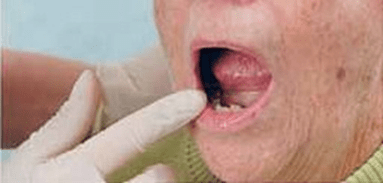Oral care is an important aspect to end of life care. It is something that family, whānau, friends and carers can do very easily, and allows special time with the person.
The desire for food and fluids decreases when the person becomes unwell, and is dying. This is a natural body response as the organs slow down, and is part of advanced disease. This doesn’t mean that the person is starving to death, or dying of dehydration.
People at the end of life should be provided with fluid as long as they have the ability to drink. When this changes and there are indications that the person can no longer tolerate oral fluids, there are ways to provide some fluids. This is in the form of moistening their mouth. Such as using den-tips soaked in water or other preferable fluids, or using a small spray bottle also with fluids of choice. People at the end of life are vulnerable to oral problems such as thrush no matter how well their mouth is cared for. The person’s mouth should be inspected regularly to check for soreness, coating or other mouth issues such as ulcers1. Thrush is easily treated with regular mouthwashes, and using prescribed oral drops, lozenges or tablets regularly.
DRY MOUTH / MOUTHCARE
A dry mouth is also common near the end of life, and usually is a problem when people are receiving oxygen therapy, or medication.
There are some simple ways to refresh the mouth including trying pineapple juice, feijoa juice, frozen pineapple chunks, ice cubes, or acid/sour lollies to encourage saliva production. Juices have enzymes which act as a cleanser. If the person can swallow then using small chunks of ice will keep the mouth moist. If the person is unable to swallow effectively then there is more likelihood of food being trapped in the mouth2.
If the resident is not able to swallow then swabbing their mouth and lips every hour is a good comfort measure. People who are sick are more likely to develop oral thrush, which looks like small white patches in their tongue, gums and lips and can be painful. Thrush is easily treated with prescribed drops. Check the resident’s mouth regularly, and keep it clean. Use a soft toothbrush, or mouth swab to cleanse the teeth. Commercial non alcohol mouthwashes are available, or use a weak solution of bicarbonate of soda (baking soda). A half teaspoon of baking soda and a pinch of salt in half a glass of lukewarm water is an effective cleanser. Apply Vaseline, or lip balm every few hours to prevent cracked dry lips 2.

- Hospice New Zealand, Carers New Zealand, New Zealand Carers Alliance. (2017). Oral care for someone who is dying.
- Hospice New Zealand. (2016). A Guide for Carers. Wellington New Zealand.

